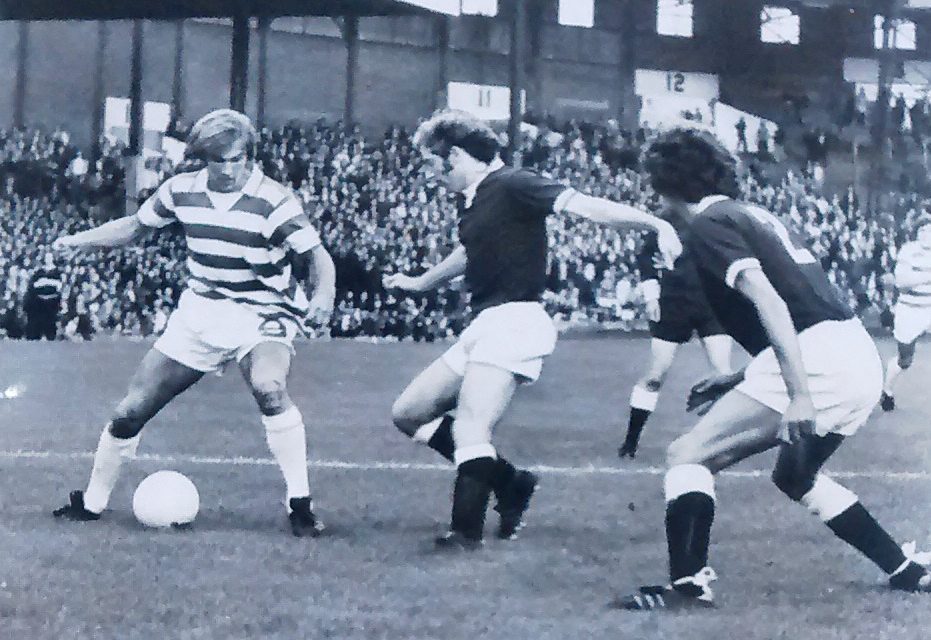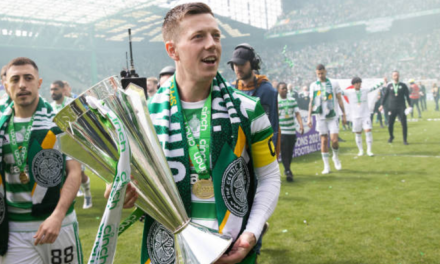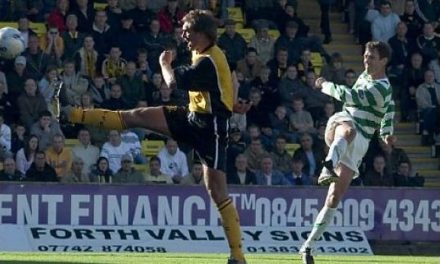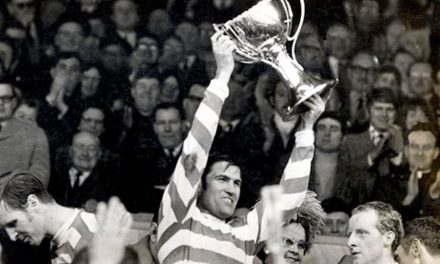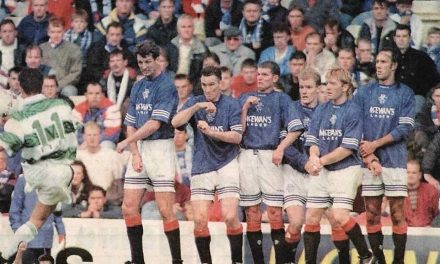With Celtic due to take on Hearts in a League Cup tie at Parkhead on Sunday, St Anthony casts his mind back to another important Celtic v Hearts League Cup encounter from 1975.
20 August 1975 Celtic 3-1 Hearts Attendance: 26,000
As Kenny Dalglish led the Celtic team out on a warm August evening, he was given an especially good reception from the Celtic support inside Parkhead. For several weeks Dalglish had been in dispute with the club regarding a new contract and as the vultures from England had hovered, it seemed likely that Kenny would follow Lou Macari and Davie Hay’s path down south to the riches of the English game. Happily, the matter was resolved with Kenny being given the Celtic captaincy, and a lucrative new contract which made him the best paid player in the Scottish game, much to the joy of the Celtic fan base. With Jock Stein still in the early stages of recuperating following a serious car crash, it was left to the persuasive powers of Sean Fallon to coax Kenny to stay. Celtic’s management were credited for sorting out a difficult situation despite announcing losses of £19,000 for the financial year. However, it is worth noting that Chelsea reportedly still owed Celtic £80,000 from the transfer of David Hay.
This fixture was part of the 4 team League Cup group stage and Celtic were in a pickle after losing 2-0 to Hearts at Tynecastle just the previous week. A win was therefore imperative to keep the Celts on course towards their 11th consecutive League Cup final, with Aberdeen and Dumbarton being the other two teams in the group. In terms of team selection there was much delight at George Connelly being named on the subs’ bench after another prolonged hiatus away from the club following personal problems in his life.
The Dalglish feel good factor was reflected in the team’s performance when Celtic took the lead in the first minute after left back Andy Lynch’s cross eluded the Hearts defence for Ronnie Glavin to score with a powerful volley. The fans were in great voice and when Dalglish, in full flow and displaying his many talents, was treated roughly by Hearts’ players, the supporters were not slow in voicing their displeasure. Hearts most dangerous player was their ex-Celtic winger, Bobby Prentice, and it took two fine saves from Peter Latchford to deny Prentice an equaliser. Latchford was still a relative newcomer to Celtic and his improving performances now saw him build a fine rapport with the fans after a shaky start to his Celtic career.
On the stroke of half time Celtic scored a spectacular second goal. A Harry Hood corner was over hit and as the ball fell to the left hand side of the area, Andy Lynch hit a first time shot which swerved past Hearts’ goalkeeper, Jim Cruickshank, and into the net. Celtic were now in top gear with the erratic Paul Wilson missing a sitter from two yards out before Johannes Edvaldsson claimed his side’s third goal with a powerful header following another Hood corner.
Drew Busby, Hearts’ powerful striker, pulled one back but it was very much a consolation goal with Celtic running out deserved 3-1 winners. The Celtic supporters that night were watching a team who were very much in transition with a large turnover in their playing personnel. In the previous 12 months Celtic had lost Jim Brogan, Billy McNeill, Jimmy Johnstone, Steve Murray (cruelly, through injury), Davie Hay, Jimmy Quinn and Vic Davidson. Sadly, George Connelly would not last much longer and he too would be gone. In contrast there was now a new generation of Celtic player with a selection of costly purchases such as Lynch, Glavin, Latchford, and Edvaldsson combining with the home grown talents of youngsters, Roddy MacDonald, Jackie McNamara, and Andy Ritchie.
However, it was the importance of retaining Dalglish’s services which was very much celebrated on this night. That fine scribe, Ian Archer, commented in the Glasgow Herald the next day that ‘Celtic without Dalglish is comparable to a plane without wings. With him, they fly.’ Kenny’s talents would keep the Celtic on course for another two years before departing for Liverpool in 1977. To use Archer’s analogy, the Celtic plane then spectacularly crashed into pieces following his departure from but that would be deserving of an article in its own right to explain in full. For the Celtic fans who attended on that happy night in 1975, they were just relieved to have him, even if it would be just for another two years.

